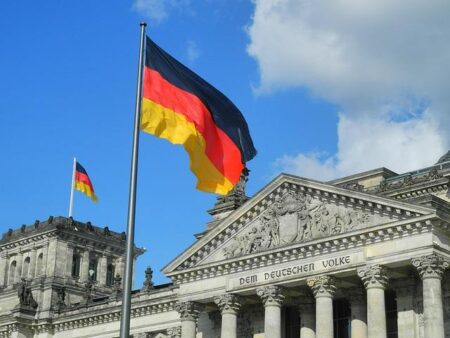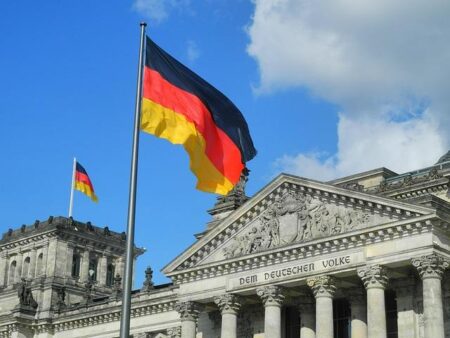Subscribe to Updates
Get the latest creative news from FooBar about art, design and business.
Browsing: European Union
Germany’s Friedrich Merz has achieved a significant breakthrough in securing approval for a massive spending plan aimed at stimulating economic growth. The initiative, seen as a pivotal move for the economy, is set to reshape fiscal policy and address pressing challenges.
As the UK braces for the reimposition of tariffs on steel and aluminum under the Trump administration, industry leaders express concern over potential market disruptions. Government officials are strategizing to mitigate economic fallout while seeking new trade partnerships.
The German Parliament is currently engaged in heated debates over proposed reforms to the country’s debt brake, a fiscal rule aimed at limiting government borrowing. As economic pressures mount, lawmakers are grappling with balancing fiscal responsibility and urgent public spending needs.
Italy and Spain have expressed reservations about the European Union’s proposal to enhance military support for Ukraine. Their hesitance underscores internal divisions within the bloc as it navigates its strategic response to the ongoing conflict.
In a recent Bloomberg article, Escrivá highlighted Spain’s appeal as a prime location for settlement, citing its robust quality of life, vibrant culture, and favorable economic environment. This sentiment reflects the increasing interest in Spain as a destination for expatriates.
In a recent address, PM Pedro Sánchez emphasized Spain’s responsibility to support nations threatened by Russian aggression. He called for increased solidarity within the European Union, urging member states to bolster diplomatic and military assistance to ensure regional stability.
Italy has proposed a new initiative within the EU aimed at enhancing defense capabilities without increasing national debt. The plan involves leveraging EU guarantees, seeking to bolster security amidst rising geopolitical tensions.
Germany’s political landscape shifted as major parties reached a landmark agreement on a historic debt deal. This pact aims to stabilize the economy, addressing rising concerns over public spending and economic recovery, while ensuring fiscal responsibility.
Italy and Spain have voiced support for France’s initiative aimed at revitalizing the EU chemicals industry. This collaborative effort seeks to address competitive challenges, enhance sustainability, and ensure the sector’s resilience in a rapidly evolving market.
In a significant policy shift, German leaders have reached an agreement to increase spending on defense and climate initiatives. This move reflects a commitment to bolster national security and address pressing environmental challenges.
In a dramatic late-night meeting, a critical 3 a.m. showdown solidified Merz’s innovative strategy to revitalize Germany’s economy. Key stakeholders rallied behind the plan, marking a pivotal moment for the nation’s financial future amid escalating challenges.
The European Union has initiated legal action against Spain, accusing the country of implementing discriminatory tax policies that unfairly target non-residents. This move highlights ongoing tensions regarding tax equity within the bloc.
Germany’s Chancellor Olaf Scholz has welcomed the European Union’s response to newly imposed U.S. tariffs, viewing it as a unified stance that strengthens transatlantic relations. He emphasized the importance of solidarity among EU member states in addressing trade challenges.
Canada and the European Union have announced retaliatory tariffs in response to recent U.S. trade policies, further escalating tensions in the ongoing trade war initiated by the Trump administration. The new tariffs target key industries, highlighting global trade frictions.
Spain is set to launch an extensive mapping initiative to identify critical resources as part of its strategic push for raw materials. This effort aims to bolster the country’s supply chain resilience and reduce dependency on imports, supporting sustainable development.
France’s nuclear capabilities serve as a strategic deterrent not only for itself but potentially for its European allies. However, the question remains: can its neighbors effectively integrate under this nuclear umbrella while navigating their own security concerns?
Germany’s recent shift in fiscal policy marks a significant turnaround, as increased spending aims to bolster its economy and strengthen its role within the European Union. This move positions Germany back at the forefront of European decision-making.
France and Germany are embroiled in a dispute over the “buy EU” initiative aimed at increasing defense spending and military cooperation within the bloc. Tensions rise as each nation advocates for its own armament industries, complicating collective security efforts.
Italy is reconsidering its agreement to utilize Elon Musk’s Starlink satellite internet service. Concerns over data security, regulatory compliance, and the impact on national infrastructure have led to increased scrutiny of the initiative.
In a surprising turn of events, former President Donald Trump has announced a proposed plan to “liberate” Germany from what he describes as bureaucratic constraints imposed by the EU. This controversial stance has ignited debates over sovereignty and transatlantic relations.























